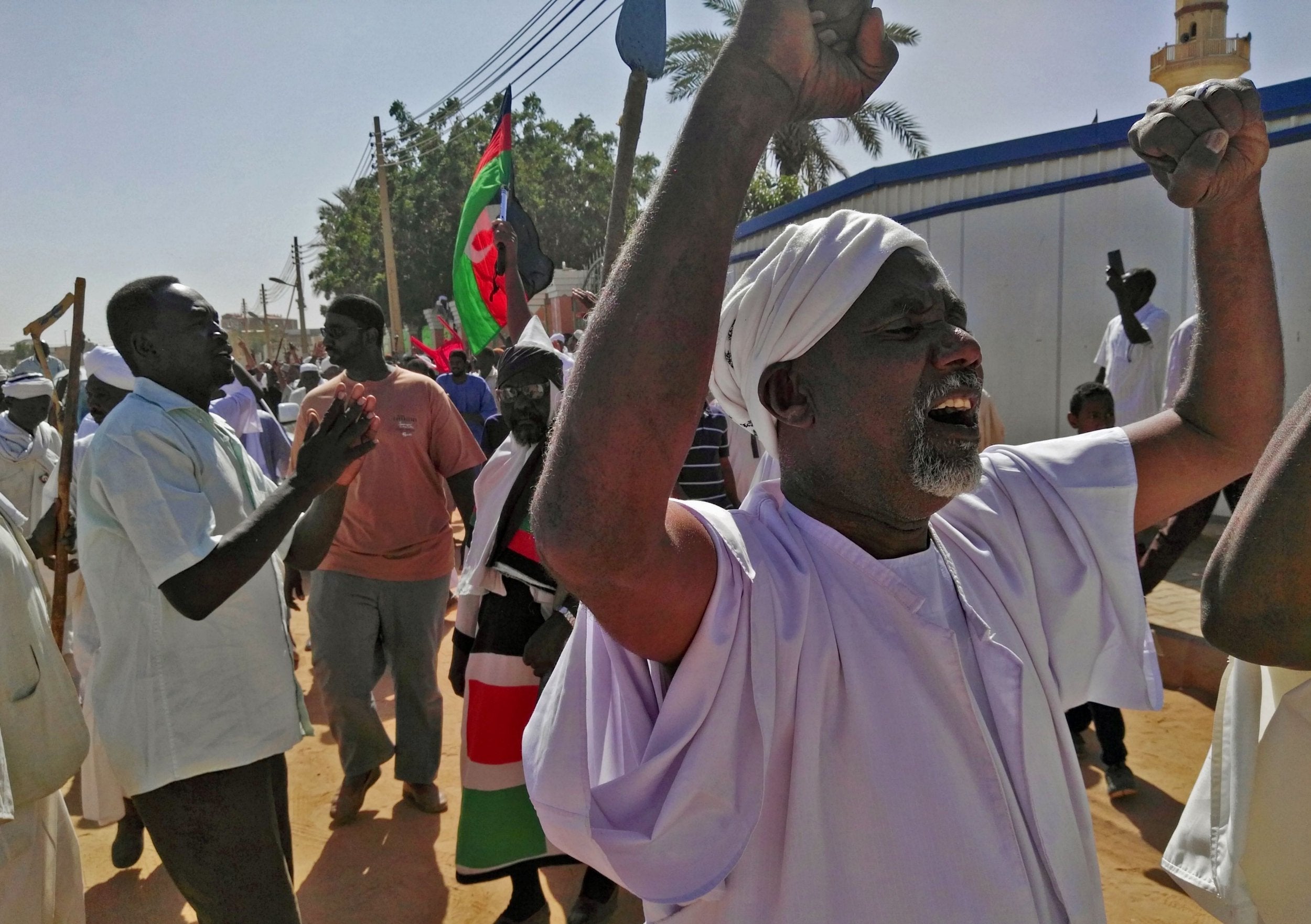Sudan police officers shoot at people mourning man killed during anti-government protests, witness says
Around 5,000 people gather outside home of 60-year-old protestor who died from gunshot wound

Your support helps us to tell the story
From reproductive rights to climate change to Big Tech, The Independent is on the ground when the story is developing. Whether it's investigating the financials of Elon Musk's pro-Trump PAC or producing our latest documentary, 'The A Word', which shines a light on the American women fighting for reproductive rights, we know how important it is to parse out the facts from the messaging.
At such a critical moment in US history, we need reporters on the ground. Your donation allows us to keep sending journalists to speak to both sides of the story.
The Independent is trusted by Americans across the entire political spectrum. And unlike many other quality news outlets, we choose not to lock Americans out of our reporting and analysis with paywalls. We believe quality journalism should be available to everyone, paid for by those who can afford it.
Your support makes all the difference.Sudanese police shot live ammunition on Friday as mourners gathered outside the home of a 60-year-old protester who died from a gunshot wound sustained during anti-government demonstrations, a Reuters witness said.
Around 5,000 mourners turned out for the funeral and burial of Moawia Othman, who was shot late on Thursday during demonstrations against the 30-year rule of President Omar al-Bashir which are now into their fifth week.
There were no immediate reports of casualties. Police could not immediately be reached for comment.
Police opened fire after some mourners pelted them with rocks and overturned a police car, the Reuters witness said.
Mourners also blocked a main street in the Burri district of the capital Khartoum with stones and chanted "There is no God but God!" and "Martyr! Martyr!" Several were wailing and crying and some were carrying Sudanese flags.
After Othman had been buried and the weekly Muslim Friday prayers began at noon, the mourners dwindled to hundreds who began chanting "Down, that's it", which has become the slogan of protesters signalling their main demand for Mr Bashir to step down.
They also chanted "Freedom! Freedom!" and "A million martyrs for a new era!" Some stood on the overturned police car.
As the atmosphere in the area grew tenser, police and other security forces pulled out of Burri completely, leaving no security presence on its streets.
Across the River Nile in the neighbouring city of Omdurman, police fired tear gas at dozens of demonstrators as they left a mosque in the Wad Nubawi district, witnesses said
Security forces have at times used live ammunition to disperse protesters. The official death toll in five weeks of protests stands at 24, including two security forces personnel. Rights groups say the figure may be nearly twice as high.
Serious Challenge
The protests were triggered by price rises, but soon developed into demonstrations against Mr Bashir. The president has responded defiantly, blaming the protests on foreign "agents". He has said the unrest will not lead to a change in government, challenging his opponents to seek power through the ballot box.
But the near-daily protests pose one of the most serious and sustained challenges to Mr Bashir's rule as his party prepares to change the constitution to allow him to seek another term.
In violent clashes in Burri on Thursday, a child and a doctor were shot dead, the Sudan Doctors' Committee, a group linked to the opposition, said. A live video posted on social media and verified by Reuters showed security forces pointing guns at protesters in Burri.
Protests also erupted on Thursday in six other cities, in some of the most widespread disturbances since the unrest began on 19 December.
The Sudanese protests began over soaring bread prices, one result of a deep economic crisis that now requires radical reforms or a bailout from friendly nations for Sudan to emerge from its downward spiral.
Critics blame years of economic mismanagement for Sudan's woes. The government announced an emergency 15-month austerity programme in October, but it still offers deep subsidies on basic goods. The inflation rate increased to 72.94 per cent in December from 68.93 per cent in November.
Sudan's economy was also weakened when the south seceded in 2011, taking about three-quarters of the country's oil wealth.
Reuters
Join our commenting forum
Join thought-provoking conversations, follow other Independent readers and see their replies
Comments